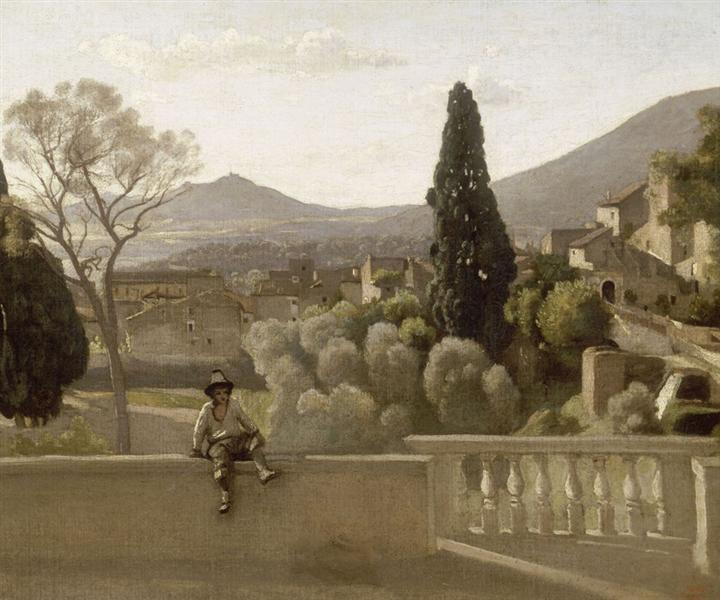Description
The painting "The Gardens of Villa D'Este - Tivoli - 1843" by Camille Corot is a sublime example of the artist's mastery in capturing light and nature, as well as a testament to the beauty of the Italian landscape. Corot, known for his training in neoclassicism and his later association with naturalism and romanticism, achieves in this work a fusion of emotionality and a precise representation of nature, characteristics that cement his legacy in the history of art.
In this work, Corot presents us with a view of the gardens of the Villa D'Este, a site famous for its great landscape beauty and its elaborate fountains. The composition is characterized by a masterful use of space and light, where the lush vegetation in the foreground intertwines with the architecture of the villa, creating an almost dreamlike atmosphere. The diagonal lines that can be seen in the layout of the roads and the rows of trees guide the viewer's view towards the background, where the villa is harmoniously placed in the scene. This use of perspective, together with the integration of architectural and natural elements, enhances the monumentality of the villa, in a game of scales that allows us to appreciate the grandeur of both the garden and the building.
The colors that Corot uses are both vibrant and subtle. The range of greens on display is rich and varied, alternating darker tones that provide depth and light that highlights the illuminated areas, achieving an almost photographic representation of sunlight filtering through the leaves. This treatment of color and light is one of the distinctive characteristics of Corot, who often worked outdoors, allowing him to capture the essence of natural light effectively. The sky, although not the main focus, appears in blue and gray tones that contrast with the warmth of the garden, adding a feeling of depth and space to the work.
Unlike other paintings of landscapes of his time, where the characters were often protagonists of the scene, in "Los Jardines De La Villa D'Este" Corot chooses not to include human figures, allowing the work to concentrate completely on the beauty of the surroundings. This decision invites the viewer to contemplate the scene in a state of peace and reflection, creating a type of intimacy with the landscape that is especially significant. This absence of characters is a resource that he uses in many of his works, thus emphasizing the sublime character of nature.
Furthermore, it is important to place Corot within his artistic context. His work not only reflects the tradition of romantic landscape, but also prefigures trends that would emerge later in Impressionism. His focus on atmosphere and light anticipates the explorations that artists such as Monet and Pissarro would undertake. As modernity progressed, his style, which balances precise representation and poetic interpretation of light, would continue to resonate with generations of artists.
Through "Los Jardines De La Villa D'Este", Corot manages not only to represent a place, but also to transmit a sensory experience, a moment of calm and admiration for nature. His ability to fuse realism and poetry has left an indelible mark on the history of art, making this work not only a testament to his mastery, but also a legacy that continues to inspire contemporary audiences and artists. In this sense, the painting invites us to reflect on the connection between human beings and their environment, a theme always present in Corot's work and landscape art in general.
KUADROS ©, a famous painting on your wall.
Hand-made oil painting reproductions, with the quality of professional artists and the distinctive seal of KUADROS ©.
Playback service paintings With a guarantee of satisfaction. If you are not completely satisfied with the replica of your painting, we refund your money 100%.

